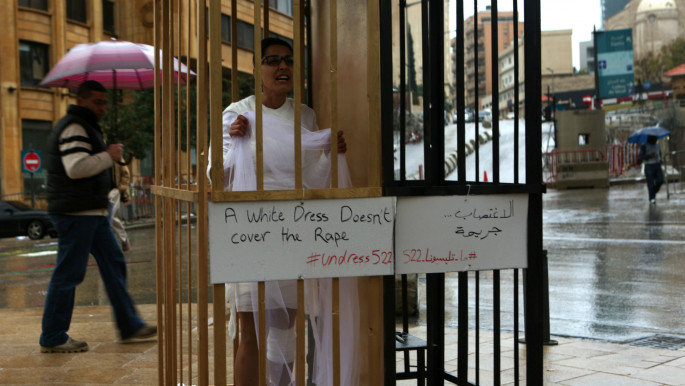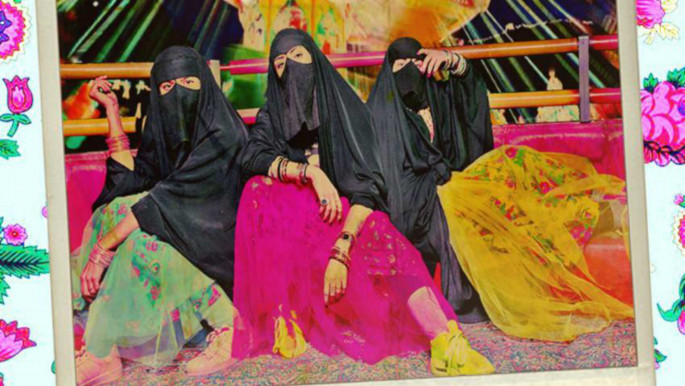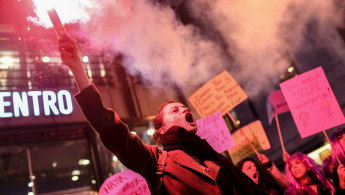Interview: The struggles of being a feminist in the Middle East
Earlier this month, women across the world celebrated after the Jordanian and Tunisian parliaments repealed a clause in its penal code that allowed a rapist to avoid punishment if they married their victim.
Victims of rape in Lebanon have now won the same victory, with the Lebanese parliament following suit and repealing a similar law from their penal code.
Women's rights activists are rightly hailed and recognised for their contribution as victories on this level are achieved. They are upheld and congratulated on matters which have long been taboo, but are now being viewed in a more humanitarian light.
Sometimes, depending on the magnitude of the victory, the activists are even seen as national heroes and a source of pride for the collective Arab identity.
But such praise doesn't always last long. Women often quickly return to being shamed and marginalised when addressing other issues deemed ayb - or culturally inappropriate - until they break yet more barriers.
"Being a women's rights activist in the Middle East is not easy," says Palestinian feminist Suad Abu Dayyeh. She is a Middle East and North Africa expert for Equality Now and campaigned to abolish the clause to free rapists from punishment if they married their victims.
"Doing what I do makes it difficult in many ways. Over the years, I had to break many barriers, both professionally and socially. I also had to deal with my family and their traditional mind-set," she told The New Arab.
A recent UN report showed that only 26 percent of men aged 18 to 59 in the Middle East believe in gender equality. The report also found that up to 52 percent of women showed active symptoms of depression.
Questioning traditions
In the Arab world, many traditions are seen as unshakable foundations of society. Much of the time, these traditions set high restrictions on gender roles, which actively infantilise girls and women and strip them of their autonomy, while being lenient on boys and men.
 |
The society I grew up around tried to force me to be submissive in more than one way, but living under systematic patriarchy made it all the worse |  |
"I experienced this myself," Suad said. "I began questioning our traditional gender roles when I was sent to boarding school, whereas my brothers were sent to private schools. It seemed unfair to me. I would always question why my mum would treat us differently based on our genders."
Growing up in Palestine, her identity had also been stigmatised not just because of her gender, but by her race - living the realties of life under the Israeli military occupation. "I had to break barriers brought by both patriarchy and occupation," she explained.
 |
|
| Read more: Lebanon becomes latest country to ban 'marry-your-rapist' law |
"The society I grew up around tried to force me to be submissive in more than one way, but living under systematic patriarchy made it all the worse."
Despite asking questions from a young age, Suad's feminism took shape at the age of 25 when she moved to the Netherlands to study a Masters degree.
'They said I ran a prostitution ring'
Ever since, Suad has dedicated her life to breaking down barriers of patriarchy for herself and others. She began working for Women's Centre for Legal Aid and Counselling (WCLA) in the occupied Palestinian territories, where she faced the bleak reality of more extreme cases of women's suffering under patriarchy.
"We had to deal with cases of domestic abuse, help women who had run away from home and even focus on abortion cases. It was risky," she said.
Because her job involved a brand of women's rights that did not conform to what society deemed acceptable, many people attempted to undermine her personally:
"One of the rumours that spread about me - people started to say that I was running a prostitution ring in the centre because I was helping out with abortions and helping women in ways that were seen as unconventional to Arab customs. I was also sexually harassed."
In societies across the Arab world, women are emotionally blackmailed with the concept of breaking certain customs, despite the fact that thesew customs have always changed through time.
Suad's case of being shamed and harassed is not an isolated one. Statistics on sexual harassment vary from country to country across the Middle Eastern and North African region, but numbers can reach as high as 99.3 percent of women being sexually harassed, such as in Egypt.
Women are often stuck living in a paradox in which their personal autonomy is suppressed, yet their bodies are objects for men to prey on. The state and household environment commonly hold women accountable for their own "purity", yet hold women responsible for actions of men who make unsolicited sexual advances on them.
 |
|
| Special coverage: Inside the fight for women's rights in the Middle East |
Breaking 'faux feminism'
Another challenge faced by feminists in the Middle East is breaking faux feminist standards. The word "feminist" is often thrown around, as though identifying as such automatically emancipates women and upholds the so-called respect a "feminist man" has for women, regardless of problematic notions they may sustain.
"It isn't just men who take advantage of feminism for their own personal gain, it's women too," Suad explains.
"A man doing it is bad, but there are women who would bring their own personal morals and bias on topics like sex outside marriage and abortion and will treat these topics as a red line. This is not real feminism."
This issue refers back to women constraining their activism to what is safe. It is easy to jump on a bandwagon that has already picked up momentum after taboos have already been broken and discussion has reached the public sphere.
What isn't easy is dealing with the consequences of breaking taboos to allow topics to reach the public sphere for the greater good of all women, even if you may not personally agree with the principle being discussed.
 |
We must liberate ourselves first and foremost before trying to help others |  |
Even with matters less controversial than abortion, many activists restrict their activism according to their personal comforts.
There are many women who are comfortable with being domesticated, for example. Though, in Jordan, Suad says she has seen a school curriculum which teach children as young as the age of six that the "home life" is the only option for girls.
Some women who refuse to campaign against conditioning children to conform to such gender roles will still call themselves a feminist, despite her putting her experience before the needs of others.
There are also some women who find talking about sex and the feminine anatomy uncomfortable for the same reason. This becomes a problem when women stay silent, or even oppose educating girls about sex at school.
"At the end of the day, no one is asking anyone else to give up their own personal morals, but what we as individuals may believe should not skew our activism to match our own moral compasses," Suad said.
'Liberate yourself first'
Despite years of struggling, and an outlook that's less than positive for the near future, Suad refuses to give up.
"The situation across the region has deteriorated and women are more likely to be subjected because of the political uncertainty around us," Suad said. "But this is not an excuse for us to give up. We must liberate ourselves first and foremost before trying to help others."
For Suad, the solution lies in putting self-emancipation first. Women ridding themselves of the internalised misogyny they have been conditioned to carry since childhood is paramount to the feminist cause.
"Only when we achieve this will we achieve a genuine feminist movement. We don't have a feminist movement in the Middle East. We only have women's rights organisations. The only way we can bolster a movement is if we deconstruct and work for the good of the collective, not for the personal ego."
Follow Suad on Twitter: @SAbudayyeh



